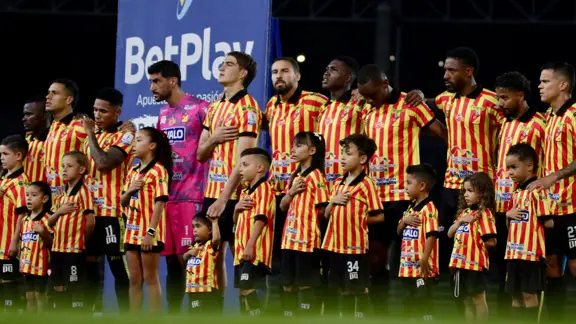News
Deportivo Pereira players on strike over unpaid wages

- Players from Colombian top flight club Deportivo Pereira refused to play their match on Friday
- They will also skip Monday night’s fixture due to the club’s failure to pay several months of wages
- “The leagues and federations are not enforcing the regulations,” said Carlos Gonzalez Puche, Executive Director of Colombian player union ACOLFUTPRO
Players from Colombian top-flight club Deportivo Pereira have gone on strike after enduring months without pay.
The team boycotted last Friday’s match against Aguilas Doradas and will also forgo Monday’s game against Deportivo Pasto, maintaining their industrial action until the club fulfils its repeated promises to settle outstanding wages.
Financial crisis and broken promises
Deportivo Pereira are facing severe financial difficulties. The Colombian National Tax and Customs Directorate (DIAN) has seized the club’s income, including television and sponsorship revenues, due to non-compliance with tax agreements.
Under an arrangement with the players, the club was supposed to make quarterly payments in March, June, and September 2025, covering salaries, social security contributions, and bonuses. However, the club has only paid 15 days’ worth of wages per quarter and made overdue social security payments only at the end of last week.
“Some people may not like this being made public, but they’ve given us their word several times and broken it every time. Things have to be said as they are,” said team captain Carlos Darwin Quintero last Thursday when announcing the strike.
In recent weeks, players had twice suspended training sessions for a day, but the situation reached breaking point last week. “Everything has a limit, and we’ve passed that limit,” said Quintero. “Who can live without receiving their full salary for eight months?”
He added: “We have debts, unpaid social security for the entire squad, and some team-mates have had to buy private insurance for their families. It’s a very complicated situation.”
According to Quintero, some players are owed up to eight months’ wages. “Who can stay calm after working so hard and not being paid for that long?” he asked. “Despite it all, we’ve continued to do our jobs. But now it’s time to act.”
Union support and emergency aid
The Colombian Association of Professional Footballers (ACOLFUTPRO) has fully backed the players and announced the industrial action. “This decision will remain in place until all obligations are paid in full,” read a statement from the union.
ACOLFUTPRO Executive Director Carlos González Puche explained to FIFPRO: “The club pays wages fortnightly but has failed to meet its quarterly obligations. They only paid social security for August and September last Thursday. Since August, the players have been competing without any social security coverage and paying doctors out of pocket to care for their families.”
“The latest broken promise exhausted everyone’s patience,” Gonzalez Puche continued. “They kept saying: ‘We’ll pay in an hour, in two hours,’ until the players simply had enough.”
Over the weekend, ACOLFUTPRO provided emergency financial assistance to help players meet essential needs. “The union used our Calamity Fund to grant a bonus so the 25-30 players could buy groceries and necessities,” said Gonzalez Puche.
He also dismissed any club statements downplaying the crisis: “If the money doesn’t show up in their accounts, no press release changes that. Statements don’t pay for schools, food, or rent.”
Calls for accountability
For Gonzalez Puche, Deportivo Pereira’s case highlights a broader failure in the enforcement of football regulations.
“The rules clearly state that a club with debts cannot hold a license or participate in the tournament,” he said. “These are binding regulations, yet the leagues and federations refuse to enforce them. They claim to self-regulate, but self-regulation has become a farce.
“The league cannot plead ignorance – they manage television rights, and if those revenues are under seizure, it’s obvious the club isn’t meeting its obligations. This is not just a Colombian problem, but a structural issue across South American football.”
The situation affecting Deportivo Pereira players is yet another example of a growing global problem. Just last week, FIFPRO highlighted a similar case in Korea’s K League 2, where players from Chungnam Asan reported non-payment of wages — reflecting a wider, systemic issue affecting players worldwide.
